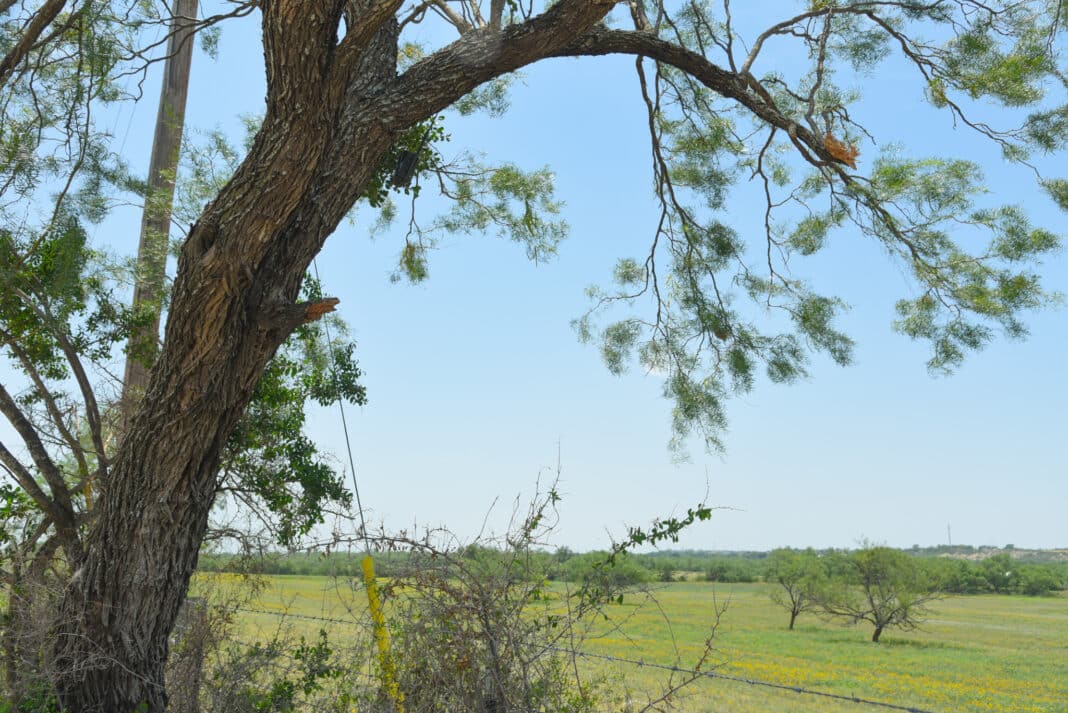VAL VERDE COUNTY — On the same day the governor visited the small city of Del Rio for a statewide summit, residents who live, govern, volunteer and serve wondered if his message would resonate with their growing needs as the region witnesses a significant increase in migrant crossings.
While some voices were heard, others, including those at the forefront of the humanitarian response efforts, were not invited to participate in the conversation.
Migrants and smugglers are historically more active in the Rio Grande Valley, where this fiscal year Border Patrol already encountered nearly 272,000 people. It represents an increase of 406% for the same period a year ago.
Fewer people crossed through the Del Rio area, about 118,000, but it represents the greatest percentage increase in Texas, at nearly 457% from the same period a year ago.
That was likely the reason why Gov. Greg Abbott chose to visit the city of about 36,000 people Thursday where he announced a broad border plan addressing the state’s intervention on a federal issue.
“A border crisis is plaguing the farmers, the ranchers, the residents of the entire border region,” Abbott said at the summit.
For those who live in Val Verde County, the statistics are more than numbers.
Earlier that day, Rob Jump, a Del Rio resident for 20 years, was preoccupied with luring a snake away from his home. He and his girlfriend, Dianne Schroeder, moved to the property three years ago after two floods previously kept them away. On a typical summer, the couple enjoys tubing down the Rio Grande as a way to relax from work. This year is different.
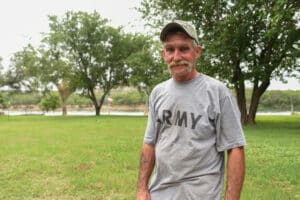
(Valerie Gonzalez | [email protected])
“You just kind of have to keep your head on a swivel and watch what’s going on,” Jump said.
“I have had people try to stop me along the road. I had a group yesterday, (Wednesday) and he had buddies in the bushes. And, that’s not cool,” Jump recalled.
He was unsure what they wanted, but Jump said the man on the road tried flagging him down. When Jump drove around him, other people emerged from the brush.
“I don’t feel threatened or nothing, at this point,” Jump said.
Schroeder, who sometimes drives out late, felt differently.
“Sometimes I work at night, and I carry a gun now in my car. I’m licensed, so I carry a gun,” she said.
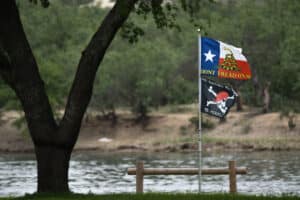
(Valerie Gonzalez | [email protected])
Their property is less than a mile away from a popular crossing point locally referred to as ‘the bus stop.’ At the end of Vega Verde, a road hugging the edge of the county, daily migrant crossers are greeted by Texas Department of Public Safety troopers stationed along that portion of the border. Border Patrol agents will then arrive with buses and vans to take migrants away for processing.
Some migrants use other routes that take them directly through Jump and Schroeder’s home, which sits on low land across a big hill on the Mexican side.
“We get the coyotes over watching us constantly,” Jump said. “They got a nice point to monitor.”
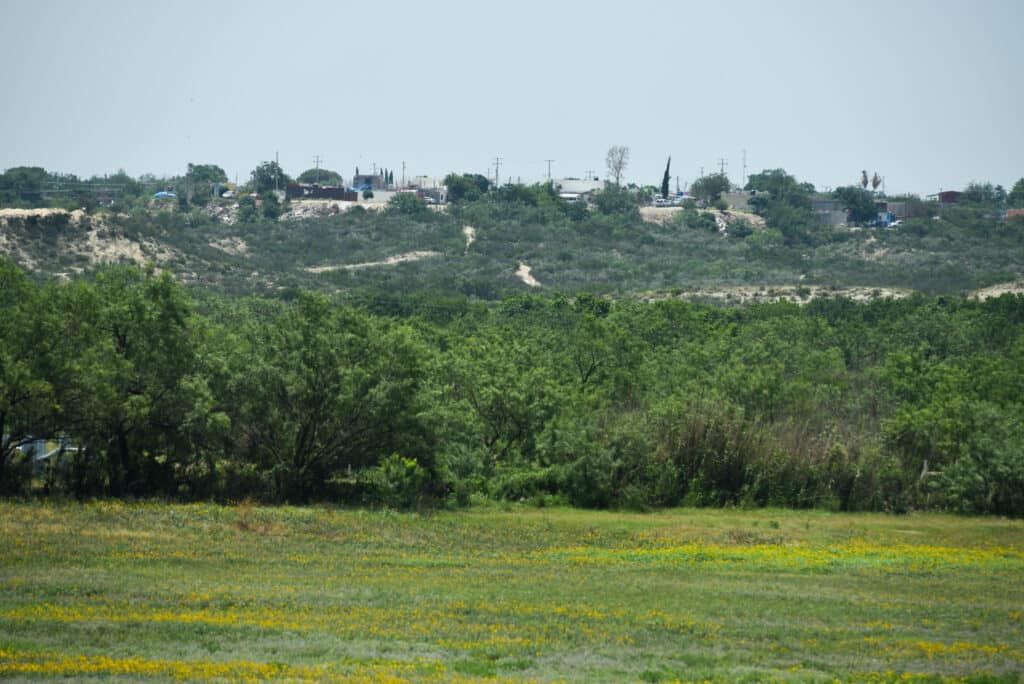
(Valerie Gonzalez | [email protected])
Schroeder said she uses her binoculars to stay vigilant when she’s alone.
“The other day when Rob was gone, I was looking at them and they were looking at me. But I do carry,” she said. She’s walked out of her house with the firearm to scare off a man who was standing on her dock one night, but Jump is trying to avoid those situations altogether.
He installed security cameras to show both sides of the property and also placed “two big, huge spot lights, like the parking lots,” Schroeder said.
City leaders are keeping an eye on the border and their budget.
Del Rio Mayor Bruno Lozano said he noticed things changed when more migrants started crossing there.
“With that has come increases in break-ins, persons running the streets and high speed chases within the city limits of Del Rio,” the mayor said Thursday as he prepared to join the governor’s summit.
Lozano agreed with Abbott’s disaster declaration, which could send migrants who trespass into private property to jail for as many as 180 days.
“It’s a strain on resources,” Lozano said.
During the pandemic, the city used the civic center, the same place that Abbott visited, to test residents for COVID-19.
“I don’t have extra facilities to house persons overnight or to even use the facilities for COVID-19 testing for migrants who are not even from here,” Lozano added.
The city is leasing a different building to the Val Verde Border Humanitarian Coalition (VVBHC), the only nongovernmental organization providing assistance to migrants released by Border Patrol in Del Rio.
Tiffany Burrow, the director of operations there, runs the interfaith short-term shelter that provides guidance to migrants released from federal custody.
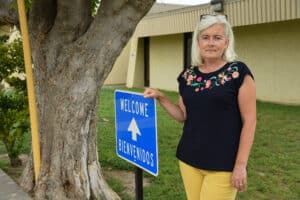
(Valerie Gonzalez | [email protected])
The organization started when the city saw an uptick in crossings during 2019. In that spring, they assisted over 7,000 people in three months.
This year, they’re receiving more people in a shorter amount of time. In March, they assisted 2,070, and two weeks ago, they assisted over 1,000 people in four days, Burrow said.
Although they may receive large groups, they all follow a similar process. Arriving migrants file along a sidewalk where they join groups by family and mode of transportation.
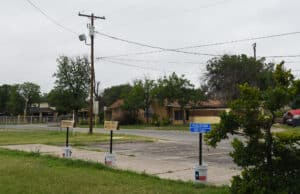
(Valerie Gonzalez | [email protected])
Migrants have access to outdoor hand-washing stations and showers. Inside, a large room is set up with chairs, phones, toys, packed lunches and other gifts to help them as they move further along their journey.
Volunteers give them an orientation to show them where they’re at, how to make calls, and purchase bus or plane tickets.
About a week ago, Burrow was told to expect fewer people to be released at the shelter “because the pathway that families take was not going to be through an NGO,” Burrow said. “It was going to go directly to ICE.”
Not all migrants who cross the border will end up at the shelter.

(Valerie Gonzalez | [email protected])
Some will circumvent law enforcement surveillance only to end up stuck in the city, cut off from help. Last month, the bathrooms of St. Joseph’s Church served as an emergency shelter.
“They get in when the bathrooms are open, but then stay the night to have a roof [over their heads],” Father Jaime Paniagua, the priest at St. Joseph’s, said Thursday.
The two Catholic churches in town he oversees are open to all, including the many Border Patrol agents who form part of the Del Rio Sector. Sometimes, migrants illegally present in the country will show up, too.
On one occasion, a 26-year-old mother with a baby girl arrived at the church.
“Father, we have spent three nights in the desert,” Paniagua said, recalling her pleas for help. “The coyote left us without anything. We are hungry. We haven’t changed our clothes, we haven’t showered. Can you help us?”
Priests and others who subscribe to Christian doctrine are morally obligated to help others, he said, but he worries the help can be considered a federal crime, harboring aliens.
“What do I do? I could be committing a crime by supporting them, but at the same time they are children of God who are asking for some help,” he said. “It’s a problem of conscience.”
Both Paniagua and Burrows attended the governor’s summit, though they did not receive an invitation like law enforcement or elected officials. Word of mouth drew them to the civic center Thursday.
Throughout the 30-minute news conference, Abbott did not address the role NGOs like VVBHC or St. Joseph’s play in addressing the needs of migrants released from federal custody.
Simply put: they felt left out.
“The governor’s press release addressed primarily the criminal element. I would ask how the documented migrant fits into the picture? Where would those families be without the assistance of NGOs,” Burrow later asked. “He discussed working within the community, and yet didn’t acknowledge the vital service that VVBHC has provided for not only migrant families but also for the city of Del Rio at no cost to the city.”
“VVBHC provides Border Patrol a secure location to release documented migrants (or those who are detained and processed) and ensures that they are able to make travel arrangements quickly. This relieves the city of having people adrift without shelter or transportation within our community. Nothing he spoke of today addressed this side of the border humanitarian crisis,” the operations director said.
Paniagua considered migrants without documents entirely.
To supplement the needs anticipated in Del Rio, Paniagua said Catholic Charities of San Antonio is planning to open an office in Val Verde to offer more humanitarian aid.
Meanwhile, parishioners continue offering their time, clothes, food and shelter knowing there won’t be any state reimbursements for them.
“We try to stay in the middle,” Paniagua said, choosing to stay apolitical, but urging both parties to come closer to each other. “We need to compromise and look at both sides and try to be in the balance, and yes, protect our communities, but also provide help for these people who are in need.”

